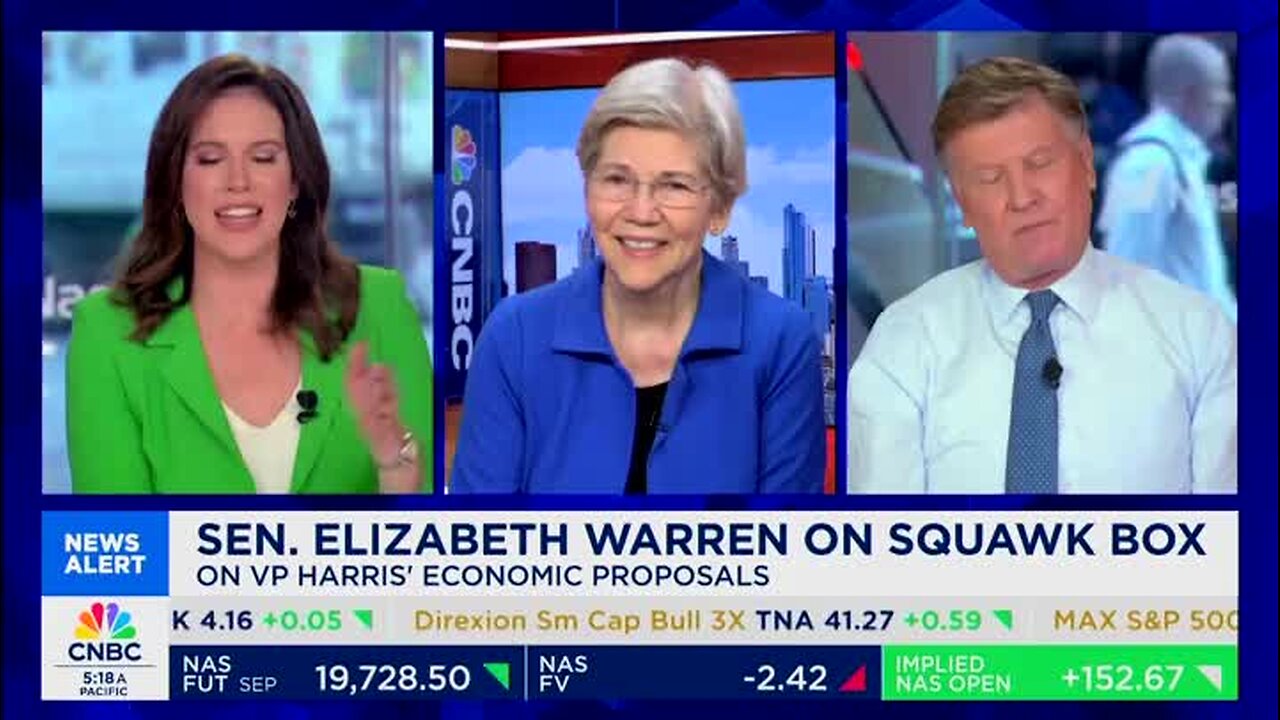Premium Only Content

Sen. Warren, CNBC’s Kernen Clash Once Again: ‘Did You Invite Me on Here Just to Lecture to Me?’
EVANS: “They take a — they look when a state of emergency is declared and they, for the most part, say, if prices go up 10 or 15% compared to before that state of emergency, you have to pay a fine. So, on a national level, how exactly would this work? Would you define the state of emergency? Does it have to be declared on a national level? Are you then talking about a 10 or 15% increase in prices versus prior to that declaration and then companies have to pay a fine? Okay, fine, maybe that applies in 1% of the situations, but this legislation, which is still vague, is making it sound like something on the scale on the broad-based price controls would be imposed, broadly speaking. So which of the two systems is it?”
Warren: “So, it is not price controls. This is about when the market itself is not functioning. Sometimes markets don’t function because there’s been a localized emergency, a hurricane, a wildfire, flooding. And so, in states that have these price gouging laws, they can come in and say, ‘Look, you can do some price increases, but if you’re going above a certain level, you have to be able to justify it.’ You have to show what you’re doing in passing along costs. A perfectly reasonable thing to do.”
KERNEN: “Senator, let’s go back to Cal-Maine, because avian flu caused the destruction of 40 million eggs. They have 20% market share. They have 20%, but they don’t control the market. It’s like OPEC, or it’s like oil. When oil prices go up for whatever reason, or they go down, when they go down, the price is set for oil. The reason that Cal-Maine made that money was because — that’s what happened to the price. The next quarter, they went down in half, they lost 50% of the profits from last — they don’t set that price. That’s the — and neither do — the Exxon does not set the price of oil. So when Exxon has $80 or $100 a barrel, yes, they make record profits. When there was a pandemic, their profits went to almost zero. Now — it’s just the way it is. And to think that the government can decide when prices are too high or too low, the grocery chains have a 2% profit margin. How about Apple with 50% or 40%? How do you decide? This is not the government’s place to do these things. It’s a fool’s errand. And also, you’re using it to divert the real cause of inflation over the last four years, which was because you had the demand after the pandemic, which obviously, you know, there was a lot because we reopened, and all of a sudden there’s supply chain issues, and the demand is juiced by all the stimulus from the IRA and all the other spending that we did.”
Warren: “There’s been many causes for inflation. We all understand. That’s why I started my answer in talking about this. But one of the causes of prices going up is that there are companies that have market dominance, that have said, ‘Oh, this is a moment when everyone’s talking about — “
KERNEN: “Okay, give me another — name another one. Give me an instance. If you give me an instance — “
Warren: “Can I just finish my argument here?”
KERNEN: “Okay, go ahead.”
Warren: “That they have gone on earnings calls and said over and over, ‘Inflation has been very, very good.’ Go listen to the earnings calls from the CEO of Chipotle who says, ‘This is a opportunity not to pass along costs. This is an opportunity for us to raise prices beyond passing along costs that increase our profit margins.’ And what the academic studies — “
KERNEN: “Did — “
Warren: “I let you finish. What the academic studies show is that industry by industry, when you see more competition, which suggests more pricing power, what we saw is that profit margins went up, and that’s the problem we’ve got. It’s that states have tools to deal with this locally, but right now we want to make sure that the FTC has the tools to do it nationally and that the states that don’t have price gouging laws also have access to those same tools.”
KERNEN: “We have anti — “
Warren: “In the same way that the FTC, for example, has tools to be able to deal with deceptive pricing and deceptive advertising, it should have the ability to deal with price gouging. It’s just another tool in the toolbox to say, we support competitive markets — “
EVANS: “For a state of emergency? Is it for a state of emergency?”
Warren: “ — that the whole point is — I let you finish your argument. Did you invite me on here just to lecture to me?”
KERNEN: “No, I just want to ask you — okay.”
Warren: “The whole point is to get markets that are more competitive, and that’s the job of the FTC. That’s something state attorneys general work on. We just want to put one more tool in the toolbox when CEOs are going on the phone saying, ‘Boy, inflation is great because it gives us a chance to raise our prices.’”
KERNEN: “So it’s not about diverting the attention away from the real issues that might actually help the middle class that you always talk about helping? For 40 years, companies didn’t know how to price gouge until three and a half years ago, when President Biden was elected? Where was the price gouging — we had 40-year-highs in inflation. We just learned how to do this three and a half years ago?”
Warren: “No. The difference is, prices were not going up. And as I said, prices started going up for a whole host of reasons. Prices went up because of the pandemic. Prices went up because of supply chain kinks. Prices went up because of the war in Ukraine. Prices were going up. And the difference is, when they started going up sharply and people noticed, that companies, some companies, also noticed, and said, ‘You know, we could raise our prices just passing along costs. That’s what you do in a competitive market.”
KERNEN: “This is not widespread, senator. This is not widespread.”
Warren: “I let you finish. I let you finish. In some markets, what we’ve seen is, in markets where there’s less competition, that CEOs said, ‘We can do more than pass along costs.’ And you don’t have to take my word for it. Do you listen to earnings calls?”
KERNEN: “I listen to earning — senator, the example you use for Kraft — “
Warren: “I let you finish. People — I let you finish.”
KERNEN: “It’s totally fallacious. It’s totally fallacious. You throw the numbers — “
Warren: “And you just want to keep talking. The earnings calls, CEOs have gotten out, it’s well-documented, and they have said, ‘We can raise our prices far more than passing along costs,’ and said to their investors, ‘We have a great future ahead of us — ‘“
KERNEN: “They can’t do that because it’s not a monopoly.”
Warren: “‘ — because our profit margins are going to increase.’”
KERNEN: “Other companies — that’s the way the system works.”
Warren: “It happens in places where there’s more concentration. That’s the whole point. It makes your point. When markets are less competitive — “
KERNEN: “Cal-Maine has only 20%.”
Warren: “ — there’s more price gouging. When markets are more competitive, it’s not priced. There is no price gouging.”
EVANS: “Would it be a state of emergency — the only last thing, Senator Warren, just to give people a sense, are we talking about what period of time for declaring when we’re — is it state of emergency? How do we define the period of time? And then by what percentage, 10, 15%? And then are we talking about fining companies? Is it modeled on the state approach here?”
Warren: “The question you ask is the same question that people want to ask about what is fraud, what is deceptive advertising. The answer is that you look at all of the facts and say, ‘Do we see a competitive market where a buyer can understand what it is that they’re being offered, and do we have a seller that’s meeting that buyer? Are they competing with other sellers?’ That’s what we do in antitrust law all day long.”
EVANS: “Yeah, it’s just the vagueness of terms.”
Warren: “There’s nothing special here. It’s putting one more tool in the toolbox when there’s a lot of concentration in an industry, and that starts pushing prices up.”
KERNE: “The example for Kraft, it’s just — if it was done in a straightforward way, senator, it would just be — your argument would be much better. When you say Kraft raised profits 440%, it was because the year before they had taken an accounting charge which brought their profit down to zero. So when they earn a normal profit the next quarter of $800 million, your people put out information that it’s up 440%. That’s disingenuous. As Kelly puts out, competition — the cure for higher prices is when people come in and undercut those prices and supply goes back up. This has been since 1776.”
Warren: “I agree with you. Take ‘yes’ for an answer. When there is competition, prices will reach the right level.”
KERNEN: “When is there — then we need antitrust laws and anti-monopoly laws.”
Warren: “Yes, we do. Yes, we do.”
KERNEN: “We already have them. We don’t need to layer another one on here that works on what — what are the number of cases you’re talking about? 1%?”
Warren: “No. So, listen again to the studies. When there is more concentration — “
KERNEN: “Which study. I think I saw the study from Groundworks. It’s a liberal think tank, senator. From Groundworks? That one?”
Warren: “If you don’t want to pay attention to the numbers, you can ignore them, you can ignore the calls. The reality is — “
KERNEN: “It’s not me not paying attention to the numbers, senator.”
Warren: “I let you talk.”
KERNEN: “Okay, all right.”
Warren: “The reality is, the American people know what’s happening in pricing. They understand that they are being gouged on prices.”
KERNEN: “Who do they blame for that, senator?”
Warren: “And who they blame for that are these giant corporations that dominate — “
KERNEN: “They blame the Biden Administration.”
Warren: “No, you blame the Biden Administration because you cannot bear the notion that sometimes these competitive markets are, in fact, not competitive. And when they’re not, CEOs have found ways to juice their profits at the expense of the American public. You may not like that, but the American people understand what’s happening and they want to have people in government who at least have tools in the toolbox to be able to respond when it happens. And that’s what this is all about.”
KERNEN: “So, the inflation has already come down without any of this happening. How does that — why do companies stop gouging? Why did Cal-Maine, why did the prices come down 50% immediately? Why does it happen?”
Warren: “I’m not at all clear that prices have come down.”
KERNEN: “Oh, so you haven’t — “
Warren: “A lot of companies — a lot of companies in very concentrated industries have raised their prices and are sitting — “
KERNEN: “The rate of inflation has come down.”
Warren: “ — and are sitting on much bigger profit margins than they were sitting on three years ago.”
KERNEN: “The profit margins are less than they were before the pandemic, senator, in the food industry.”
Warren: “They are not in industries where there’s more concentration. Look, I get it. You want to pretend that markets will always correct themselves.”
KERNEN: “No, I want to — I want to try to actually conquer inflation.”
Warren: “I’m somebody who believes in competitive markets. That’s what I want to see happen. That’s what I’m out there fighting for. But competitive markets won’t happen on their own. When these companies get bigger and bigger and bigger, one of the consequences is that they start figuring out other ways to juice their profits. They do things like they cut quality, they stop innovating, and they start building up their profit margins. You know, we have antitrust laws, and thank goodness for Lina Khan who is out there starting to enforce them and to say to these giant companies they cannot just dominate entire markets and do whatever they want, because we don’t get the benefits then of markets. This is just one more tool in the toolbox to deal with companies that use their dominance to be able to boost their profit margins. That’s all.”
KERNEN: “They’re telling me we’re out of time. Senator, it’s been real and it’s been fun and it’s good to go back and forth. We’ve done this before and we’ll have to agree to disagree. I think that the way the United States came out of the pandemic, you want to thank the government, I think the private sector we can thank for the 15 million jobs and everything else. So I think we need to embrace it. There may be a few bad actors, but the whole idea that it’s all about these bad corporations is just ill-conceived. But thanks for your time.”
EVANS: “See, she let you finish.”
KERNEN: “She did. Well, to end the interview.”
EVANS: “But she had the last word. That was very good.”
-
 1:15
1:15
Grabien
6 hours agoJohn Bolton: Trump’s Military Firings Send Message That ‘Following Orders’ Is ‘Now in Question’
19 -
 1:03:32
1:03:32
Winston Marshall
3 days ago"War On Children!" The DEMISE Of The West Starts With Schools - Katharine Birbalsingh
96.7K62 -
 48:02
48:02
Survive History
12 hours ago $3.43 earnedCould You Survive as a Sharpshooter in the Napoleonic Wars?
43.7K3 -
 12:03
12:03
Space Ice
12 hours agoSteven Seagal's China Salesman - Mike Tyson Knocks Him Out - Worst Movie Ever
31.4K14 -
 11:37
11:37
Degenerate Jay
12 hours ago $4.91 earnedJames Bond Needs Quality Over Quantity From Amazon
51.4K3 -
 15:23
15:23
Misha Petrov
12 hours agoTrad Wives & Girl Bosses Go to WAR!
46.1K42 -
 2:03:11
2:03:11
TheDozenPodcast
10 hours agoFootball villain fighting the state: Joey Barton
39K1 -
 LIVE
LIVE
Scottish Viking Gaming
13 hours ago💚Rumble :|: Sunday Funday :|: Smash the Blerps and Vape the Terpes
337 watching -
 1:45:00
1:45:00
RG_GerkClan
15 hours ago🔴LIVE Sunday Special - It's Time for World Domination - Civilization VII - Gerk Clan
78.9K27 -
 LIVE
LIVE
Major League Fishing
4 days agoLIVE Tackle Warehouse Invitationals, Stop 1, Day 3
127 watching